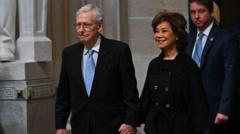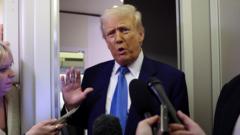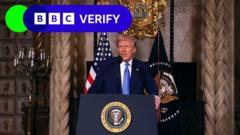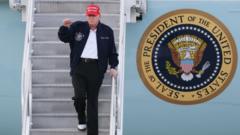The Trump administration's change in foreign policy direction raises alarm among European officials, particularly regarding troop withdrawals and the vulnerability of Ukraine to Russian advances, prompting calls for a more independent European military strategy.
A Fractured Alliance: Europe Responds to Shifts in U.S. Foreign Policy Under Trump

A Fractured Alliance: Europe Responds to Shifts in U.S. Foreign Policy Under Trump
As the Trump administration turns its focus away from Europe, leaders express concerns about the future of NATO and the fate of Ukraine.
In the closing moments of a tense diplomatic encounter, European leaders emerged from discussions with the Trump administration feeling more uncertain about their alliance with the United States. Reports suggest a marked shift in U.S. foreign policy focused on regions like Asia and Latin America, leaving Europe on edge about the implications for NATO and ongoing conflicts, especially in Ukraine.
A pervasive concern among European officials is the announced intention to withdraw thousands of American troops from Europe, a decision that poses questions about security and deterrence in the face of Russian aggression. Discussions between U.S. Defense Secretary Pete Hegseth and key European leaders highlighted fears that the Trump administration might directly negotiate with Russia’s President Vladimir Putin, potentially compromising Ukraine's territorial integrity and NATO’s collective security.
Ukrainian President Volodymyr Zelensky’s remarks during the Munich Security Conference resonated with urgency, as he decried any agreements with Russia that sidelined Ukraine. His call for a unified "army of Europe" proposed an alternative military framework that would act independently of U.S. influence, emphasizing a pressing need for regional self-reliance in security matters.
As Europe assesses its strategic options, the specter of a Eurosceptic U.S. foreign policy continues to loom large. The implications of President Putin potentially using Trump as a political pawn further fuel anxiety among NATO allies, underscoring a budding tension that could reshape transatlantic relations for years to come.
A pervasive concern among European officials is the announced intention to withdraw thousands of American troops from Europe, a decision that poses questions about security and deterrence in the face of Russian aggression. Discussions between U.S. Defense Secretary Pete Hegseth and key European leaders highlighted fears that the Trump administration might directly negotiate with Russia’s President Vladimir Putin, potentially compromising Ukraine's territorial integrity and NATO’s collective security.
Ukrainian President Volodymyr Zelensky’s remarks during the Munich Security Conference resonated with urgency, as he decried any agreements with Russia that sidelined Ukraine. His call for a unified "army of Europe" proposed an alternative military framework that would act independently of U.S. influence, emphasizing a pressing need for regional self-reliance in security matters.
As Europe assesses its strategic options, the specter of a Eurosceptic U.S. foreign policy continues to loom large. The implications of President Putin potentially using Trump as a political pawn further fuel anxiety among NATO allies, underscoring a budding tension that could reshape transatlantic relations for years to come.























